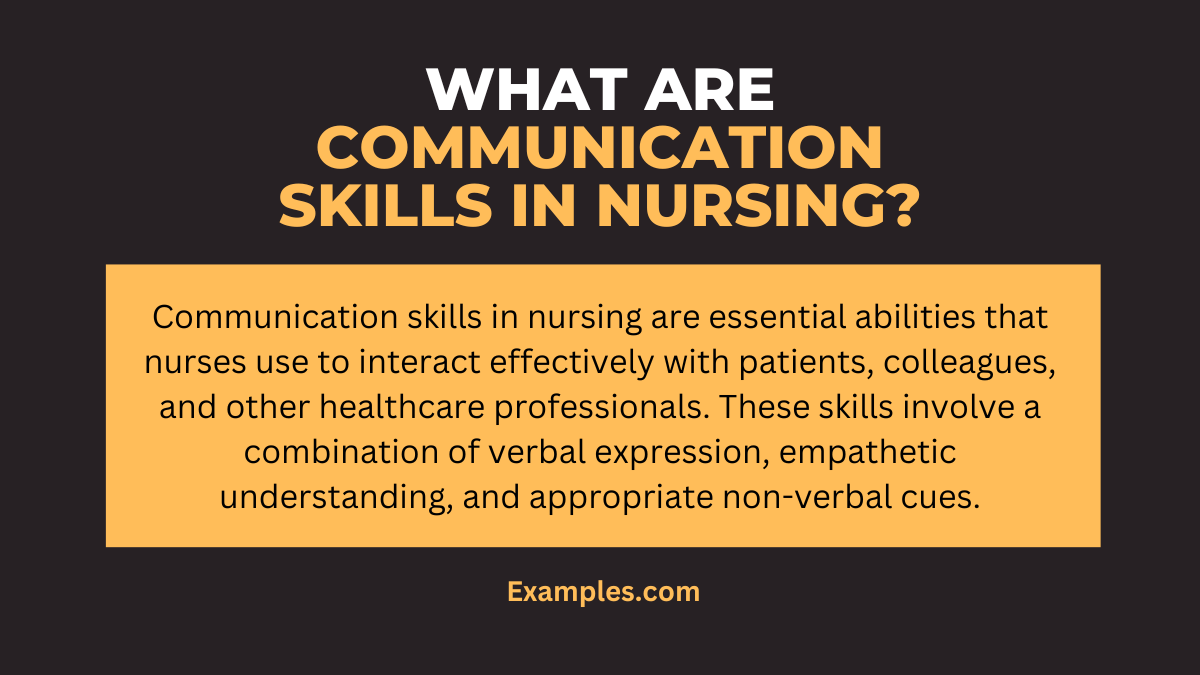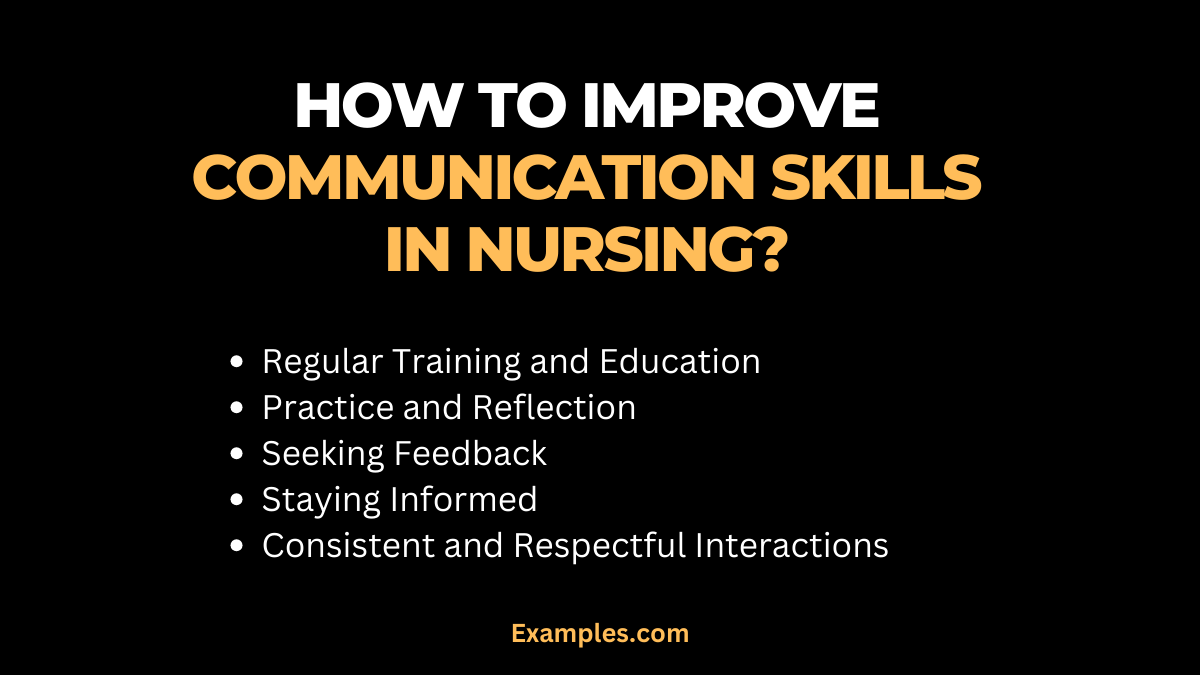29+ Communication Skills in Nursing Examples
In the dynamic field of nursing, communication skills are as vital as medical expertise. This comprehensive guide explores the nuances of communication in nursing, highlighting the importance of empathy, clarity, and effectiveness. Through real-life communication examples, nurses can learn how to enhance patient interactions, collaborate efficiently with healthcare teams, and navigate challenging conversations. This resource is essential for any nursing professional aiming to provide exceptional care and build strong, trust-based relationships with patients and colleagues.
What are Communication Skills in Nursing?

Communication skills in nursing are essential abilities that nurses use to interact effectively with patients, colleagues, and other healthcare professionals. These skills involve a combination of active listening, clear verbal expression, empathetic understanding, and appropriate non-verbal cues. Effective communication in nursing includes:
- Active Listening: Fully focusing on the speaker, understanding their message, and responding thoughtfully.
- Empathy: Showing genuine care and understanding of patients’ emotions and experiences.
- Clarity and Conciseness: Conveying information in a straightforward and understandable manner.
- Patient Education: Clearly explaining medical procedures and treatments to patients.
- Interprofessional Communication: Collaborating and sharing information effectively with other healthcare team members.
These skills are crucial for providing quality patient care, ensuring safety, and maintaining a positive working environment.
30 Communication Skills in Nursing Examples
Effective communication in nursing is critical for providing high-quality patient care and ensuring smooth team collaboration. This section offers 30 distinct examples of communication skills specifically tailored for nursing professionals. Each example includes practical communication sentences and explanations, demonstrating how nurses can apply these skills in various clinical settings. These examples focus on empathy, clarity, patient engagement, and teamwork, essential for fostering a healing environment and promoting patient well-being.
- Empathetic Patient Interaction: “I understand this procedure can be concerning, let’s go through it together.”
Shows empathy and reassurance to patients facing anxiety about medical procedures. - Clarifying Patient Concerns: “Could you tell me more about the symptoms you’re experiencing?”
Encourages patients to share details, aiding accurate diagnosis. - Active Listening to Patient Feedback: “I’m here to listen to all your concerns.”
Demonstrates attentiveness and willingness to understand patient issues. - Effective Handover Communication: “The patient in room 5 requires extra monitoring for their blood pressure.”
Ensures critical patient information is accurately conveyed to the next shift. - Delivering Difficult News with Sensitivity: “I need to discuss your test results, let’s find a quiet place to talk.”
Shows consideration in choosing an appropriate setting for sensitive conversations. - Assertive Communication in Team Meetings: “Based on my observations, I suggest we revise the care plan.”
Demonstrates assertiveness and confidence in sharing professional opinions. - Collaborative Communication with Colleagues: “What do you think about this approach for our patient’s care plan?”
Encourages teamwork and collective decision-making in patient care. - Patient Education on Medication: “This medication helps with your condition by…”
Informs patients about their medications and their effects in an understandable way. - Calm Communication in Emergencies: “Please stay calm, we are doing everything we can to help you.”
Maintains composure and reassures patients during emergency situations. - Showing Compassion in Palliative Care: “We are here to make you as comfortable as possible.”
Expresses compassion and support in end-of-life care. - Building Rapport with Patients: “How are you feeling today compared to yesterday?”
Establishes a connection and tracks patient progress. - Respecting Patient Privacy: “I assure you that your health information will remain confidential.”
Reassures patients about the confidentiality of their health information. - Handling Patient Complaints: “I understand your frustration, let’s see how we can address this.”
Addresses patient grievances with understanding and a proactive approach. - Encouraging Patient Autonomy: “What are your thoughts on the options we discussed?”
Supports patient involvement in their own care decisions. - Positive Language in Patient Interactions: “You’re making great progress with your recovery.”
Uses positive affirmations to encourage and motivate patients. - Explaining Procedures Clearly: “Here’s what will happen during the examination…”
Provides clear and concise explanations of medical procedures. - Cultural Competence in Communication: “I respect your cultural practices and will accommodate them in your care.”
Acknowledges and respects diverse cultural backgrounds in patient care. - Non-Verbal Cues in Patient Assessment: Observing patient’s body language to gauge discomfort or pain.
Utilizes non-verbal communication to enhance patient assessment. - Communicating with Pediatric Patients: “This little bandage will help your boo-boo heal faster.”
Uses age-appropriate language and tone with child patients. - Debriefing After Critical Incidents: “Let’s discuss what we learned from this situation.”
Facilitates team learning and improvement following challenging incidents. - Feedback to Nursing Students: “You did well in administering the IV, next time make sure to double-check the dosage.”
Provides constructive feedback to enhance learning and development. - Verbalizing Observations: “I’ve noticed a change in your breathing pattern, let’s monitor it closely.”
Vocalizes clinical observations for thorough patient monitoring. - Inclusive Communication with Family Members: “We value your input in your family member’s care plan.”
Includes family members in discussions about patient care. - Setting Expectations with Patients: “You should start to see improvement within a few days of starting this treatment.”
Sets realistic expectations about treatment outcomes. - Negotiating with Patients on Care Choices: “If you’re uncomfortable with this option, we can explore alternatives.”
Shows flexibility and willingness to consider patient preferences. - Motivational Communication for Patient Adherence: “Sticking to your medication schedule will greatly help your recovery.”
Encourages patients to adhere to treatment plans for better outcomes. - Confidential Discussions about Health Issues: “Let’s talk in a private space about your health concerns.”
Prioritizes privacy in discussing sensitive health issues. - Reassuring Patients During Procedures: “You’re doing great, we’re almost done with this part.”
Offers reassurance and support during medical procedures. - Communicating with Diverse Age Groups: Adapting communication style to be effective with different age groups, from children to seniors.
Demonstrates adaptability in communication with a varied patient demographic. - Expressing Gratitude to Team Members: “Thank you for your quick response in that emergency, it made a difference.”
Acknowledges and appreciates the efforts of fellow healthcare professionals.
Why are Good Communication Skills Important for Nursing?

Good communication skills are vital in nursing for several reasons. They enhance patient care and safety, facilitate teamwork, and improve the overall efficiency of healthcare services.
- Improving Patient Outcomes: Effective communication helps in understanding patient needs, leading to accurate diagnoses and better care plans.
- Building Trust and Rapport: Good communication establishes trust between nurses and patients, essential for effective treatment and care.
- Enhancing Team Collaboration: Clear and concise communication among healthcare professionals ensures coordinated and efficient patient care.
- Reducing Errors: Accurate and timely information exchange can significantly reduce medical errors and enhance patient safety.
- Supporting Patient Compliance: Patients are more likely to follow treatment plans when they understand their condition and care process.
In essence, good communication skills in nursing are fundamental to every aspect of patient care and are integral to the success and effectiveness of the healthcare system.
How Do Nurses Demonstrate Communication Skills?
Nurses exemplify communication skills through various methods that are critical for effective patient care and team collaboration.
Empathy and Active Listening
- Understanding Patient Needs: Nurses show empathy by attentively listening to patients, understanding their concerns and fears.
- Active Engagement: They engage in active listening, ensuring the patient feels heard and understood.
Clear and Concise Information Delivery
- Explaining Medical Information: Nurses break down complex medical jargon into understandable language for patients and families.
- Effective Handover: They communicate critical patient information clearly and succinctly during shift changes to other healthcare professionals.
Non-Verbal Communication
- Body Language and Gestures: Nurses use supportive body language and facial expressions to convey care and understanding.
- Observing Patient Cues: They are adept at reading non-verbal cues from patients, which is essential in patient assessment.
Emotional Support and Reassurance
- Providing Comfort: Nurses offer comfort and reassurance, especially in stressful or painful experiences.
- Emotional Availability: They remain emotionally present and supportive, building trust and rapport with patients.
How to Improve Communication Skills in Nursing?

Improving communication skills in nursing involves continuous learning and practice. Here are some ways nurses can enhance these skills:
Regular Training and Education
- Communication Workshops: Attending workshops and seminars focused on healthcare communication.
- Continued Education: Enrolling in courses that emphasize patient-nurse communication.
Practice and Reflection
- Role-Playing Scenarios: Practicing different patient scenarios to improve verbal and non-verbal communication skills.
- Self-Reflection: Reflecting on daily interactions to identify areas of improvement.
Seeking Feedback
- Peer Feedback: Asking colleagues for constructive feedback on communication methods.
- Patient Feedback: Encouraging patients to provide feedback on their communication experience.
Staying Informed
- Keeping Up-to-Date: Staying updated with the latest communication techniques and tools in healthcare.
- Technology Utilization: Learning to effectively use healthcare communication technology.
Tips for Effective Communication Skills in Nursing
Effective communication is a cornerstone of nursing. Here are some tips to enhance these skills:
Build a Rapport
- Personal Connection: Taking time to know patients personally helps in building rapport.
- Showing Interest: Genuine interest in patients’ lives enhances communication.
Be Clear and Direct
- Clarity in Instructions: Giving clear and direct instructions to avoid confusion.
- Simplifying Medical Terms: Using layman’s terms when explaining medical conditions and treatments.
Maintain Professionalism
- Respectful Interaction: Always communicating with respect and professionalism.
- Confidentiality: Upholding patient confidentiality in all communications.
Adaptability
- Adjusting Communication Style: Adapting communication style based on patient age, culture, and understanding.
- Flexibility: Being flexible in approach, especially in challenging situations.
Continuous Improvement
- Feedback Acceptance: Being open to feedback and willing to improve.
- Self-Awareness: Being aware of one’s own communication style and its impact.
By following these guidelines, nurses can significantly enhance their communication abilities, leading to improved patient care and more effective teamwork in healthcare settings.
In conclusion, communication skills in nursing are pivotal for ensuring effective patient care and fostering a collaborative healthcare environment. Nurses who excel in these skills enhance patient comfort, ensure clearer understanding of medical needs, and contribute significantly to positive healthcare outcomes. Embracing these communication techniques is essential for every nursing professional committed to providing exceptional patient care and maintaining a productive and harmonious workplace in the healthcare sector.



